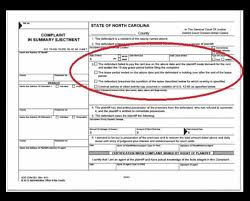
Being served with a summary ejectment notice the legal process landlords use to evict tenants in North Carolina can feel overwhelming. At Prosperity North Carolina, we know that housing stability is the foundation for thriving families and communities. That’s why we want to walk you through what this process means, what rights you have, and what steps you can take to protect yourself and your family.
1. Understanding Summary Ejectment in North Carolina
In North Carolina, eviction cases are legally called summary ejectment proceedings. They are filed when a landlord believes a tenant has violated the lease usually for nonpayment of rent, holding over after the lease ends, or breaching lease terms.
The process is governed primarily by Chapter 42 of the North Carolina General Statutes. Key things to know:
The landlord must file a Complaint in Summary Ejectment in Small Claims Court.
You will receive a Summons and Complaint with a court date usually within 7 business days of service.
The case will be heard before a magistrate, not a jury.
If the landlord wins, they receive a Judgment for Possession.
2. Don’t Ignore the Summons
If you do nothing, the court will likely rule in favor of the landlord by default. This can result in:
Losing your housing
Owing back rent and court costs
Receiving an eviction record that can make it harder to rent in the future
Always attend your court date.
3. Preparing for Your Court Date
Bring documentation that supports your case, such as:
Proof of rent payments (receipts, bank statements, money order stubs)
Written communications with your landlord (emails, texts, letters)
A copy of your lease agreement
Photos of any repair issues, unsafe conditions, or code violations
Witness statements if needed
4. Legal Defenses You May Have
North Carolina tenants do have rights. Some possible defenses include:
Rent was paid or accepted. If you paid rent (even partial) and the landlord accepted it, the eviction may be barred.
Improper notice. The landlord must follow correct notice procedures before filing. For nonpayment of rent, no advance notice is required, but for other breaches or lease expirations, written notice is often necessary.
Uninhabitable conditions. If the landlord failed to maintain a safe, habitable home (heat, plumbing, electrical, structural safety), you may raise a defense under the Warranty of Habitability (G.S. § 42-42).
Retaliation or discrimination. Eviction cannot legally be in retaliation for requesting repairs, joining a tenants’ organization, or based on race, gender, family status, disability, or other protected characteristics under Fair Housing laws.
5. After the Hearing
If you win: You remain in your home.
If the landlord wins: The magistrate will issue a Judgment for Possession.
The landlord must then request a Writ of Possession, carried out by the Sheriff’s Office, usually within 10 days.
You have the right to appeal within 10 days of judgment. An appeal moves your case to District Court, where you can request a jury trial. To appeal, you may need to post a bond (often the amount of rent owed).
6. Financial & Legal Help
Prosperity North Carolina encourages tenants to seek help immediately:
Legal Aid of North Carolina: Provides free legal representation for eligible tenants.
Housing counseling agencies: Can guide you on rental assistance, mediation, and payment plans.
Rental and utility assistance programs: Available through local county social services offices and nonprofits.
Faith and community partners: Often step in to provide emergency aid.
7. Practical Steps You Can Take Now
Communicate with your landlord. Try to negotiate a payment plan or settlement before court.
Seek rental assistance. Programs in Durham, Orange, and Chatham Counties still provide emergency housing funds.
Document everything. Keep a paper trail of rent paid, conditions reported, and communications made.
Know your rights. Even if eviction is granted, the sheriff must carry it out landlords cannot legally remove you, change locks, or shut off utilities on their own.
8. Prosperity NC’s Commitment
At Prosperity North Carolina, we believe no one should face eviction without knowing their rights or having access to resources. Through Project Open Door, we are expanding legal aid for undocumented families and supporting tenants statewide who are at risk of losing their homes.
Housing is justice. Housing is health. Housing is stability.
If you’ve been served with a court date for summary ejectment, know that you are not alone. With preparation, advocacy, and community support, you can protect your rights and work toward long-term stability.


